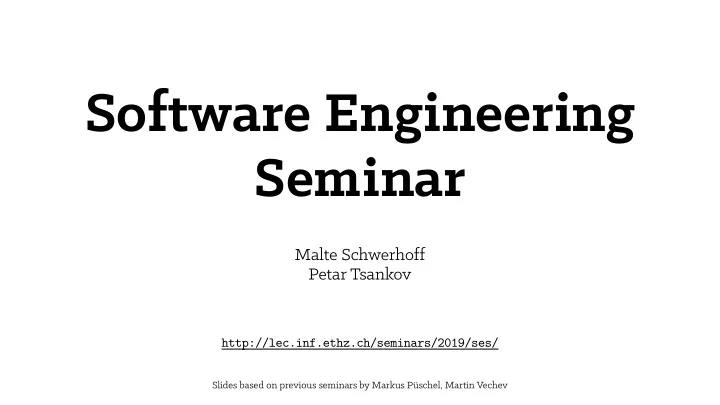

Software Engineering Seminar Malte Schwerhoff Petar Tsankov http://lec.inf.ethz.ch/seminars/2019/ses/ Slides based on previous seminars by Markus Püschel, Martin Vechev
Learning Objects • How to present technical work • How to read, dissect and assess research papers • Learn about research directions in software engineering 2
The Team • Malte Schwerhoff, Petar Tsankov • Teaching assistants (advisors): • Jingxuan He <jingxuan.he@inf.ethz.ch> • Pinjia He <pinjia.he@inf.ethz.ch> • Eilers Marco <marco.eilers@inf.ethz.ch> • Manuel Rigger manuel.rigger@inf.ethz.ch • Tyler Smith <tyler.smith@inf.ethz.ch> • Samuel Steffen <samuel.steffen@inf.ethz.ch> • Joao Rivera <hector.rivera@inf.ethz.ch> 3
Preparing Your Talk Know presentation date Study paper Draft presentation Send draft to advisor Meet advisor, get feedback 4
Preparing Your Talk: Know Date Know presentation date Study paper Start early! Draft presentation • Understanding a paper takes time • As does preparing a good presentation Send draft to advisor Meet advisor, get feedback 5
Preparing Your Talk: Study Paper • Carefully read the paper Know presentation date • Details matter • Understand terminology and subtle differences • Briefly read cited papers, if necessary Study paper • Be critical • Limitations? Draft presentation • What are the authors not telling us? • Potential improvements? Send draft to • Hands-on advisor • Try examples on paper • Try tools, if available Meet advisor, get • Consult advisor (for important questions) feedback 6
Preparing Your Talk: Draft Slides • Presentation duration: 30 minutes (plus questions) Know presentation date • General guidelines : a presentation • cannot contain all details Study paper • should intrigue audience; get them to read the paper • Explain motivation and context Draft (and practice) • Intuition and solution idea before technical details … presentation • … but present technical solution as well • Use your own examples (and demo tool, if possible) Send draft to advisor • Conclude : results, limitations & future work, your personal assessment Meet advisor, get • Practice! feedback 7
Preparing Your Talk: Meet Advisor Know presentation date • Meeting your advisor is mandatory • Contact your advisor, and send draft, at least 10 days Study paper before your presentation • Technical questions: consider sending alongside draft Draft (and practice) • Ask for general feedback , and specific hints and presentation suggestions • Update presentation Send draft to advisor • In case of fundamental changes: ask for a second meeting (or brief feedback via e-mail) Meet advisor, get feedback 8
Presentation Style • See these slides by Markus Püschel • General guidelines: slides and speaker complement each other • Slides: • Text: short; verbalise details • Try to visualise (diagrams, figures, code snippets, ...) as much as possible • Try to avoid text-only slides • Try really hard to not start with a text-only slide • Presentation: • Check your speaking pace • Try to enthuse the audience • Be yourself :-) 9
Public Feedback • Audience asked to give feedback right after your presentation • You’ll be asked if you’d rather not have this (or inform us ahead of time) 10
Grading • Your presentation • How well did you understand the paper? • Did you cover the important aspects? • Did you use your own examples? • Was the presentation clear and understandable? • How did you handle questions from the audience? • Did you incorporate advisor feedback? • Did your presentation (roughly) last 30 minutes? • Seminar participation: • Did you attend all sessions? • Did you ask good questions? • Did you provide feedback? • We’ll consider paper difficulty, order of presenters, advisor feedback 11
Schedule • Two meetings per seminar session • First two presentations on Monday 7.10. (no class before that) Date Legi Paper Advisor 07.10. 16-916-421 Optimizing Dynamically-Typed Object-Oriented Languages With Polymorphic Inline Caches Manuel 07.10. 17-947-599 Is search really necessary to generate high-performance BLAS? Tyler 14.10. 17-936-188 NetComplete: Practical Network-Wide Configuration Synthesis with Autocompletion Sam 14.10. 17-934-258 Leveraging Rust Types for Modular Specification and Verification Marco 21.10. 17-932-880 Towards Optimization-Safe Systems: Analyzing the Impact of Undefined Behavior Manuel 21.10. 17-923-301 teEther: Gnawing at Ethereum to Automatically Exploit Smart Contracts Jingxuan 28.10. 17-921-891 A Fast Analytical Model of Fully Associative Caches Joao 28.10. 17-920-414 Compiler Validation via Equivalence Modulo Inputs Manuel 04.11. 17-916-818 MadMax: Surviving Out-of-Gas Conditions in Ethereum Smart Contracts Sam 04.11. 17-916-412 Optimistic Loop Optimization Joao 11.11. 17-916-131 T-Fuzz: Fuzzing by Program Transformation Jingxuan 11.11. 17-914-003 Programming and Proving with Distributed Protocols Marco 18.11. 17-913-930 Effective Program Debloating via Reinforcement Learning Jingxuan 18.11. 17-913-823 Cradle: Cross-backend validation to detect and localize bugs in deep learning libraries Pinjia 25.11. 17-913-542 FLAME: Formal linear algebra methods environment Tyler 25.11. 17-913-534 One VM to rule them all Manuel 02.12. 16-941-601 REMIX: Online Detection and Repair of Cache Contention for the JVM Joao 02.12. 16-929-036 Communication lower bounds for distributed-memory matrix multiplication Tyler 09.12. 17-948-167 DeepXplore: Automated Whitebox Testing of Deep Learning Systems Pinjia 09.12. 16-915-175 TensorFuzz: Debugging Neural Networks with Coverage-Guided Fuzzing Pinjia 16.12. 16-914-871 SecCSL: Security Concurrent Separation Logic Marco 16.12. 15-938-426 Detecting Violations of Differential Privacy Sam • Preliminary schedule, check website for up-to-date version 12
Good Luck! & An Interesting Seminar
Recommend
More recommend